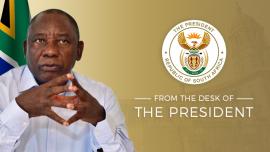
PRETORIA, Sept 17 (NNN-SANEWS) — Following a meeting of the party leaders last week, South Africa’s President Cyril Ramaphosa says in his weekly newsletter that he is even more convinced that the Government of National Unity (GNU) is essential for the growth and development of the country.
“I am convinced that the GNU will not only survive, but that it will thrive. South Africans expect the GNU to succeed, and we will not let them down,” the President said.
On Wednesday last week, the leaders of the parties that form the GNU met to reflect on how the GNU is working.
Three months have passed since 10 parties represented in Parliament signed a Statement of Intent committing themselves to work together in government and Parliament to advance the country’s interests.
The parties agreed to certain fundamental principles, including to respect the Constitution and the rule of law and to promote accountability, transparency, integrity and good governance.
The parties also agreed on a common minimum programme that would form the basis of the work of the GNU. At its first Cabinet Lekgotla in mid-July, Ministers and Deputy Ministers drawn from the GNU partners, together with Directors-General and other officials, developed priority actions to give effect to the minimum programme.
Since these priority actions were outlined in the Opening of Parliament Address on 18 July 2024, the President said Ministers and Deputy Ministers have been hard at work to implement the tasks assigned to them.
“For a few Ministers and Deputy Ministers, being in the Executive is a new experience and for some it has been quite an adjustment. But with the support of their departments, they have all hit the ground running. Across all parties, Ministers and Deputy Ministers are making headway in confronting the challenges the country faces.
“What is significant and most welcome is that the members of the Executive have undertaken their work as part of a Cabinet collective. Although they are drawn from different parties, they have pursued the common GNU programme. They have worked in a spirit of cooperation and collaboration as Cabinet colleagues to serve the interests of the South African people,” the President said.
President Ramaphosa added the members of the Executive have each understood their role in advancing the three strategic priorities of the seventh democratic administration.
“The priorities are clear – a commitment to drive inclusive growth and job creation. A clear focus to reduce poverty and to tackle the high cost of living. A resolve to build a capable, ethical and developmental state.
Ministers and deputy ministers have been focused not on the interests of their respective parties, but on the common mandate they have received to build and develop the country,” he said.
The President said there was general agreement among the party leaders last week that the GNU has made a good start. They believe that the GNU is working well and that everyone is playing a constructive role.
“As party leaders, we nevertheless recognise that the parties in the GNU represent a range of political and ideological perspectives. There are issues on which we disagree and there will be times when differences between the parties will become more apparent.
“A case in point has been the debate around the Basic Education Laws Amendment (BELA) Bill, which I signed into law last week. Even as the leaders were meeting last week, some parties in the GNU were publicly urging me not to sign the Bill, while others were saying that I should sign the Bill,” he said.
The President highlighted that the Constitution is quite clear on the responsibilities of the President with respect to signing legislation.
He explained that once a Bill has been passed by Parliament, the President must either assent to the Bill or, if they have reservations about its constitutionality, refer it back to Parliament.
“Since, after considering all the various submissions, I had no such reservations about the BELA Bill, the Constitution obliged me to assent to it. However, even as I signed the Bill, I noted that some of the parties in the GNU said they wanted to engage each other on parts of the bill dealing with issues of school admissions and language.
“To give the parties time to discuss these issues, I said we would delay implementation of the Act in order for parties to engage and come up with proposals, if any, on the relevant clauses,” the President said.
In taking this approach, President Ramaphosa said he sought to establish a culture of openness and dialogue among the GNU parties.
“We are also drawing on a long history in South Africa of engagement among parties on matters on which they seem far apart.
“As times, agreement can be reached when matters come to a head at the last minute enabling all parties to focus on finding solutions and discovering that there is more that unites them than what separates them. We cannot guarantee that the parties that have requested timeout to engage will reach agreement on every difficult issue. But we need to make every effort to find common ground,” the President said. — NNN-SANEWS



